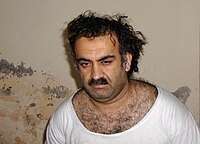Transcript of 9/11 confession by Khalid Sheikh Mohammed released
Thursday, March 15, 2007

Khalid Sheikh Mohammed, alleged 9/11 mastermind and number 3 in Al-Qaeda's hierarchy, confessed on Saturday that he was responsible for beheading Wall Street Journal reporter Daniel Pearl in 2002, according to a military tribunal transcript released by the Pentagon. The transcript also details how Mohammed, through a representative, confesses that he "was responsible for the 9/11 Operation, from A to Z."
September 11, 2001 attacks
edit"I was the Operational Director for Sheikh Usama Bin Laden for the organizing, planning, follow-up, and execution of the 9/11 Operation under the military commander, Sheikh Abu Hafs Al-Masri Subhi Abu Sittah," Mohammed confessed according to the transcript. He also expressed remorse for the children harmed during the World Trade Center operation. "I don't like to kill people," he said.
The transcript contains a list of 31 items Mohammed wholly or partially confesses to. These include alleged Al-Qaeda attacks such as the bombing of a night club in Bali and the attempt by Richard Colvin Reid to use a shoe bomb to bring down a U.S. airplane. According to the document, Mohammed also confesses to planning attacks against the Panama Canal, suspension bridges in New York, former U.S. President Jimmy Carter, the Sears Tower, Big Ben, Heathrow Airport and more.
Daniel Pearl killing
editMohammed admitted to decapitating Daniel Pearl, a reporter for the Wall Street Journal in the city of Karachi, Pakistan in 2002.
Daniel Pearl was working on a story in Pakistan in January of 2002 when he was taken hostage. Pearl was investigating the British "shoe-bomber" Richard Reid, and links between Pakistan's intelligence agency, the Inter-Services Intelligence and al-Qaeda.
Military tribunal for Guantánamo prisoners
editThe case of Khalid Sheikh Mohammed is being put through a closed military tribunal, consisting of three military officers and a government-selected representative. Human rights organizations have criticized this approach, because the defendant is not allowed to freely chose who represents them, and the courts are closed to public scrutiny.
Another transcript of a Guantánamo Bay hearing of Abu Faraj al-Libbi, also released yesterday, explains the prisoner's opinion about the closed military tribunal hearings: "I have been held by the United States for over two years without any indication of how the judicial system is going to deal with my situation. It is my opinion the detainee is in a lose-lose situation."
Mohammed refused to take the oath, explaining that he wasn't lying, but that taking the oath would be recognizing the court. He also accused the U.S. of double standards, comparing the 9/11 attacks to the killing of people in Iraq.
Khalid Sheikh Mohammed was apprehended in Rawalpindi in March 2003. According to the New York Times, the Justice Department and the CIA approved of using harsh interrogation techniques on him, such as "waterboarding", which involves a prisoner being strapped to a board and water being poured over him, which simulates drowning. During the hearing, Mohammed presented a written statement claiming abuse by U.S. personnel during his detention.
Sources
edit- Mike Mount. "Khalid Sheikh Mohammed: I beheaded American reporter" — CNN, March 15, 2007
- "Al-Qaida suspect 'confesses' to killing Pearl" — Guardian Unlimited, March 15, 2007
- United States Government. "United States Department of Defense: Transcript of Hearing" — US Department of Defense, March 15, 2007